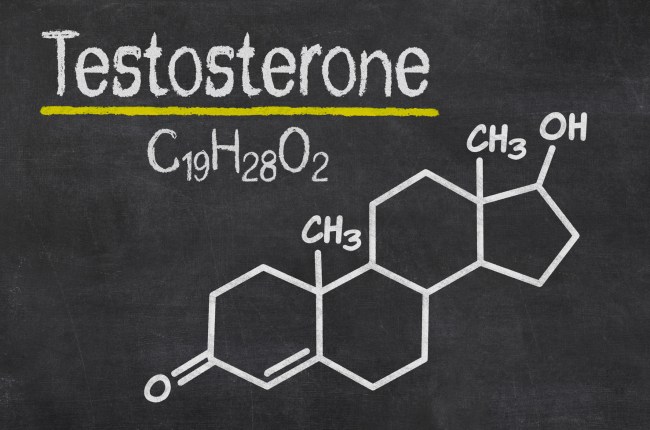
iStockphoto / Zerbor
I think every bro has heard of testosterone. And as bros, we know it’s important, but most don’t know why, and just how important it actually is.
This is not only evident by the continuously decreasing testosterone levels in men today, but their reluctance to do anything about it. In fact, research suggests that around 25% of men suffer from low testosterone, although this number could be higher because many doctors don’t immediately think or test for low T, especially in younger males.
In this article, we’re going to talk about the importance of testosterone, why having low T is bad for your health, and how you can make sure you keep your levels are where they should be.
Role of Testosterone
Testosterones main function in men is maintaining sex drive, sexual performance, sperm production, bone and muscle mass, energy levels, mood, and overall health.
Testosterone is mainly secreted by the sex organs, and to a lesser extent the adrenal glands. For males, the normal range runs between 300-1,000 ng/dl. But here’s the deal; as we age, testosterone production naturally decreases. So while this range is considered normal, the younger you are, the higher on the range you should be.
Testosterone, Exercise, and Body Composition
While testosterone is essential for maintaining lean tissue, it does not aid in muscle building as much as people think. Yes it does help, but according to this study, the muscle gains seen by increasing testosterone levels were not significant until levels exceeded the normal range, i.e. what you would see from people using steroids.
What it does seem to have a significant impact on however, is fat loss. This study showed that the higher your testosterone levels, the leaner you tend to be. This is because testosterone naturally inhibits the creation of fat cells. And unlike with muscle building, increasing your testosterone within the normal range does seem to significantly impact fat loss.
Testosterone and Health
Testosterone plays a key role in maintaining bone density, which helps stave of osteoporosis. And, since testosterone helps prevent the accumulation of fat mass, it also helps prevent the diseases associated with higher body fat levels, like heart disease, diabetes, and certain cancers.
Testosterone also affects our mental health, specifically our risk for depression. And while it’s not completely clear whether low testosterone causes depression, or depression contributes to low testosterone, it’s clear the two are linked.
Testosterone and Sex
For many people, this is where signs of low T are most prevalent. Testosterone is responsible for pretty much everything having to do with your sex life.
While there is no definition of a “normal” sex drive, any noticeable drop in sexual desire or libido could be a sign of low testosterone. This also includes lack of sexual enjoyment, arousal, erection quality, and performance.
Getting Checked and Treatment
Whether you think you might be suffering from low T or not, it’s important to get yourself checked so you have a baseline. It’s best to start in your early 20’s and then get retested every 3-5 years to keep tabs on your levels.
On average, men’s testosterone levels decline about 1% per year after age 30. What scientists are discovering however, is this has less to do with actual aging, and more to do with how men take care of themselves as they age.
In order to make sure your T levels stay as high as possible, or to help increase low T levels, here are some things you can do naturally…
Increase consumption of healthy fats and cholesterol
Diets with a higher intake of saturated and monosaturated fats have been shown to increase testosterone levels because fats play a key role in hormone production. Similarly, because testosterone comes from cholesterol, it only makes sense that low HDL cholesterol levels (the good kind) would lead to lower levels of testosterone as well.
Examples of the right kinds of foods to include in your diet are red meat, cheese, eggs, olive and coconut oil, nuts, avocados, and peanut butter.
Supplementation
Most supplements claiming to raise T levels are complete garbage. About the only ones that have shown any positive relationship to high testosterone levels are Vitamin D3 and Omega-3 fish oil.
This study showed that supplementing with vitamin D3 can boost testosterone levels, while fish oil has been shown to help increase the production of Luteinizing Hormone, which is a precursor for testosterone production.
Perform regular high-intensity exercise
There is an overwhelming amount of research that says regular high-intensity exercise, like resistance training, can greatly increase the amount of testosterone the body produces.
This means performing exercises like squats, deadlifts, rows, presses, and chin-ups. All of these are compound, multi-joint movements that will stimulate the release of the most amount of testosterone.
Get enough sleep
Most of our testosterone is produced at night, so the better your sleep and the more you get, the higher your testosterone levels. This is also why you often wake up with erections. If you don’t consistently, it could be a sign of lower testosterone levels. Getting less than 7-9 hours of sleep can reduce morning testosterone levels up to 10%
Control stress and anxiety
When we’re stressed, our body’s release cortisol. And while cortisol is good in small amounts, too much of it too often can kill testosterone levels. This also goes back to getting enough sleep, as being unrested can greatly increase cortisol levels.
Doing things like meditating, reading, and activities you enjoy can help manage stress and anxiety.
Have more sex
As if you need another reason…
Monitoring and managing T levels is extremely important for us as men, not only for our overall health, but our sex lives too. Get yourself checked, and implement the steps above to make sure you T levels are as high as they can be.